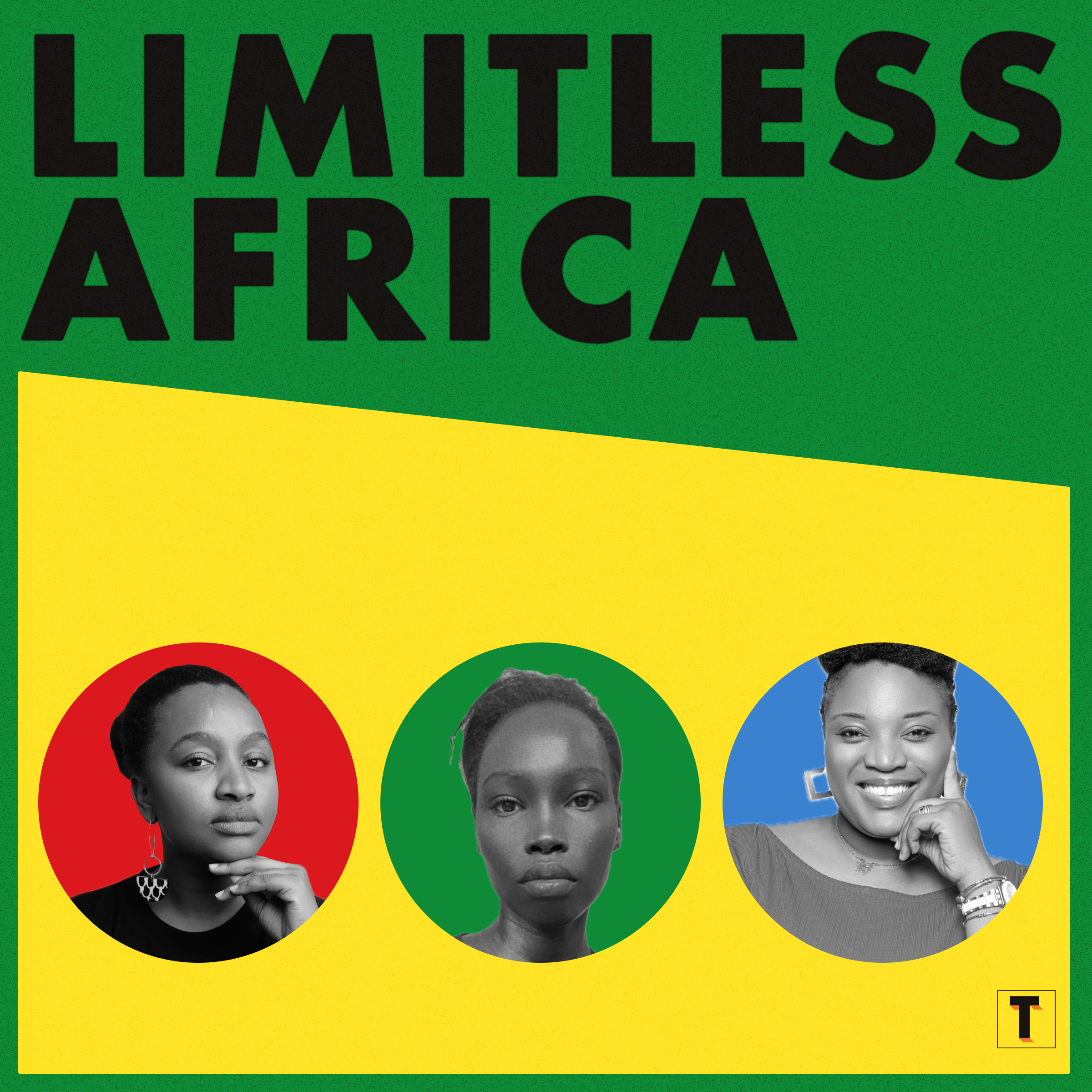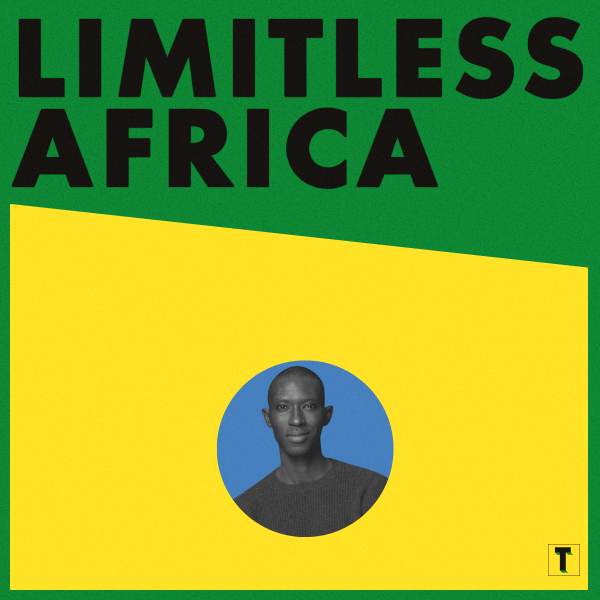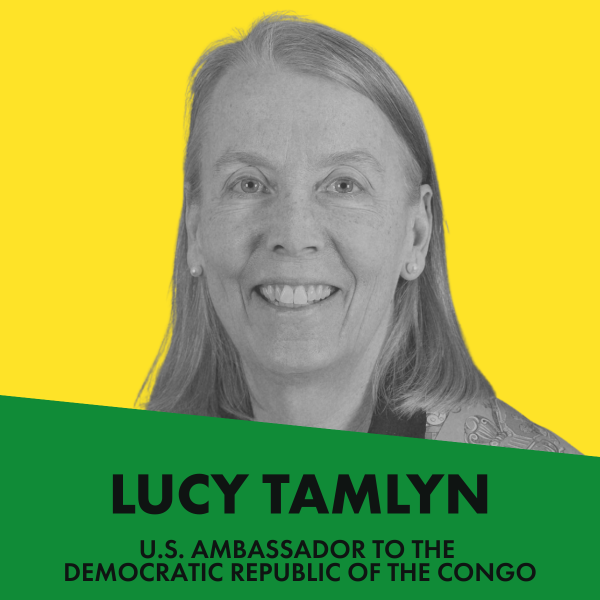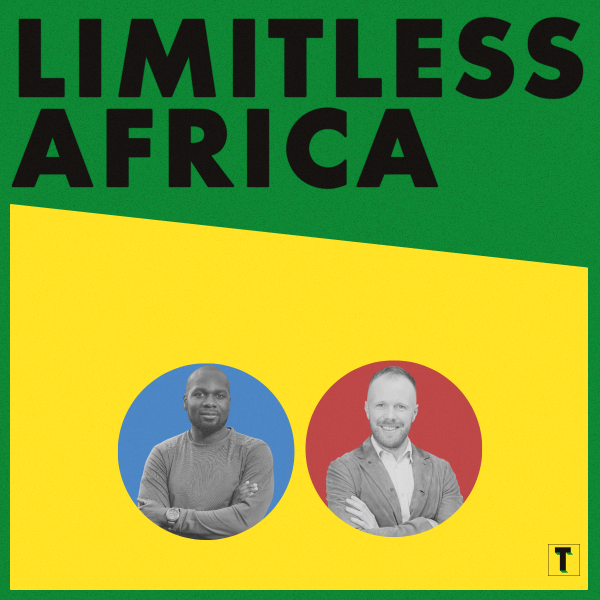How can we champion African beauty?
With guests Carmen Miral, Mari Malek, Patricia Lamah

Episode notes
Three black beauty entrepreneurs challenge stereotypes
Transcript
In this episode we discuss black beauty
“They put like powder on me where I was grey as hell.”
“When I was at university I whitened my skin and I straightened my hair.”
“I had to sit on the floor of a market to look after my natural hair.”
Claude:
Welcome to Limitless, the podcast that asks the questions that matter for Africa.
In each episode, we ask three guests about one issue that matters to Africans. We’re looking for African solutions to African problems.
...In this episode we discuss black beauty
“They put like powder on me where I was grey as hell.”
“When I was at university I whitened my skin and I straightened my hair.”
“I had to sit on the floor of a market to look after my natural hair.”
Claude:
Welcome to Limitless, the podcast that asks the questions that matter for Africa.
In each episode, we ask three guests about one issue that matters to Africans. We’re looking for African solutions to African problems.
The Limitless Podcast is supported by the U.S. Department of State and the Seenfire Foundation.
In this episode of Limitless Africa, we speak to three black beauty entrepreneurs. They’re challenging stereotypes and championing natural beauty.
First up, Mari Malek, a South Sudanese model who lives in NYC. She started the beauty brand WAU – that’s spelt W A U. Beauty products include shea butter made on the banks of the river Nile. Wau is named after her village in South Sudan. This is where the shea butter is made by local women and then shipped to customers all over the world. She spoke to our correspondent Awut Atak. Mari started off by explaining why she founded Wau brands.
Mari:
And I wanted to start a business. First I wanted to focus it on a beauty business or makeup because we never had makeup for us.
I went to shows and I looked like a ghost. They put like powder on me where I was grey as hell. And I’m like what is happening? Let me just put my butter on that makes me look more shiny. .
So the women that make the butter are from South Sudanese. They’re South Sudanese women. They are refugees and they make it in the village.
So it is a win win for all of us. And it’s about creating a mastermind for us to elevate ourselves
You think about the biggest beauty product, what are they using? Shea butter, what are they what are they using natural skincare? Where’s it coming from? Mainly from indigenous women. And that is mostly from African woman.
Awut:
So could you could you talk about maybe the challenges or the opportunities that you find in being an entrepreneur in this respect?
Mari:
Yeah, absolutely. And I’m learning because I’m not like, you know, entrepreneur have been doing it for years. And I’m just starting a more like a humanitarian, but I learned that in order for me to make something I also need to make some sort of business or product happened, right? And this is where I use my platform on purpose.
Everything I do is for purpose and on purpose.
Refugees are entrepreneurs. We are not no lazy people. My mother when she escaped with us, she did not escape so we can come to America and be lazy.
When we come here, our parents, and our mind is about how are we going to build some store so thought of a business entrepreneurship, something that will change our lives.
So for me to have created WAU brands was what is the most, most authentic thing that aligned with my spirit and my soul’s mission.
Awut:
Could you tell us a bit about your your day to day running the business what is it like?
So we’ve been working all day every day. My home is like a warehouse now like Madame CJ Walker
I’m packaging every day. Hundreds and hundreds of shea butter from South Sudan that’s made by South Sudanese women. It cost me way more money to deliver it here to America and bring it to the people versus the production.
There are challenges there and in being able to bring it across. There’s a lot of challenges. Yeah, it’s been a pain in the ass. Like there was electricity situations going on like that. There’s no regular DHL like we are unprivileged people. I have customers who are like, where’s my order I just ordered last week and where is it?
It has been challenging and people are thinking like we’re Amazon. I’m like no, this is coming straight from the village and mind you the work that goes into it with the woman making it into a village. That’s next level story.
It’s not a factory with machines.
This is a man made beautiful ancient being product that we were born with centuries and centuries ago. Cleopatra used to be the net this ancient Nubian product. This is all natural baby. This is coming from the ancestors.
Claude:
Patricia Lamah, is a beauty entrepreneur from Guinea. She runs beauty salons and also sells her own beauty products. She used to be a lawyer but gave it up to start a hairdressing business. She’s won the award for best hairdresser in francophone Africa. Our correspondent Mamadou Mouctar Souaré spoke to her.
Mamadou:
Hello, please introduce yourself to our listeners!
Patricia:
Hello, I am Patricia Lamah, an entrepreneur in natural beauty and founder of the brand PatsNaturalBeauty a company which promotes natural beauty in its hair salon, and also with its natural hair and beauty products
Mamadou:
Your passion for African beauty is well known. What set this passion off?
Patricia:
I think it’s really a personal thing. I have to tell you that when I was at university I whitened my skin and I straightened my hair. So I was a victim myself of whitening and straightening hair. I decided to go back to natural and I think it was the best decision I could have made for myself today. I love helping other women to go back to their natural beauty and to accept their beauty and really celebrate it. That’s how my passion came about.
Mamadou:
Your career started off in a bank and ended up in a hair salon? How did that come about?
Patricia:
My origins, well I could say that I have always been in the entrepreneurial space. I worked alongside my job at the bank. But the turning point came, when I abandoned everything, when I was awarded the Kitoko hairdressing prize which is the pan african competition for hairdressers. And after that, there was quite a lot of demand. So I saw that I was blossoming more in the hairdressing space than at the bank. So I had to make a choice and today I don’t have any regrets.
Mamadou:
You quickly brought out a line of beauty products to help African women care for their hair and skin. Was it a way of fighting back against skin whitening?
Patricia:
When we started to offer hair dressing services at our beauty institute, we realised that beauty products that we bought to take care of the hair of our clients were actually made from ingredients found in Guinea. That’s why we looked to train ourselves to be able to produce cosmetic goods. Already the products we were buying were expensive and they were difficult to find in Guinea. That’s why we set up a laboratory for cosmetic products for everyone, men, women, children, for the body and for hair.
Mamadou:
When did you realise the recipe was working?
Patricia:
I realised when I ran out of stock! And clients were pestering me about the availability of products. I realised I had to increase production and that I really take it seriously. And today, even as you look at the institute today, the shelves are empty! We are always running out of stock! It’s a real success, the products are easy to use and natural without any chemicals.
Mamadou:
Is it easy for clients from Senegal, Togo, Cameroon, to buy your products?
Patricia:
Yes, there are lots of distribution channels and ways to get these products. You just need to contact us and we’ll try by any legal means, by our country representatives, to get the products to you. We do it for Senegal, or for Abidjan, so that it doesn’t cost too much and the client doesn’t have to pay too much to get their products. In ten years, I see myself in every African country and recognised as much as other brands like Nivea, or Dark and Lovely. I want the Pats brand to be known at the same level!
Claude:
Carmen Miral is the founder of the Mozambican natural skin and haircare brand, Black Khakhela. Their products include moisturisers, shampoo and deodorant. Carmen spoke to our Lusophone producer Nekane de Ozamiz.
Nekane:
Carmen Miral, welcome to our Limitless Podcast. How did you get to where you are now?
Carmen:
My project came about as a way to talk about the empowerment of women, men and the black race, as a response to some bullying I suffered. And automatically, when I dug deeper, I realized that one of the problems that existed was that there were no spaces in which beauty, skin and the whole spectrum of black people’s natural beauty was valued. There were no hairdressing salons where I, as a black woman here in my country, where we are all black, could be comfortable and have my natural hair taken care of. There was a hierarchy, where if I wanted to be well looked after I had to have a wig. But if I wanted to put in a lock of hair or an African braid, the spaces denigrated my beauty. I had to sit on the floor of a market to look after my natural hair. It was the same for cosmetics. We already have spaces, but we want products that identify us. I brought the answer. I’m a businesswoman. Even though I’m an activist, I’m a businesswoman. When I see an opportunity, I take it. And these two opportunities weren’t choices. They were answers.
Nekane:
How does Carmen define beauty?
Carmen:
I really value what’s natural. That’s my personal definition of beauty. But in general, beauty is freedom. It’s doing what you want with your body, with your mind, with your hair, without being repressed.
Nekane:
In the African context, what is the biggest challenge to natural beauty?
Carmen:
It’s social construction. It’s what we’ve been told since we were children. We can’t talk about beauty without first talking about acceptance and without talking about representation, long before that without talking about colonialism, and long before that without talking about what we were before colonialism, and now, we’re back to the point where we ask what we as a society were told was beautiful. So the African’s biggest challenge is a very small phrase, but it involves all those aspects that I said who I am, I have to believe that what I was told about my big nose, my big lip, my steel wool hair is not true. How are we going to deconstruct that? This isn’t just Carmen’s job. It’s a grassroots job, it’s a mother’s job, it’s a father’s job, it’s a school’s job, it’s a government’s job. It requires us not only to accept that we’ve been mentally deformed into believing that we weren’t beautiful, but the biggest challenge is for us all to work together to deconstruct this. How do we get there? I’m still looking for that answer. That’s my biggest challenge. I believe it’s an African challenge.
Nekane:
How do ideas of beauty affect how people judge beauty?
Carmen:
Really, if I don’t value myself, the other person won’t value me. If I don’t see myself as beautiful, the other person won’t see me as beautiful. What I see as beautiful, I transmit. If I work in a bank and I tell my colleagues that all bank employees should wear wigs because that’s my practice, it will be replicated. For example, a mother and father, no matter how much you say you like black skin, what the children see every day is what they will consume. Practices. When a mother is in the bathroom, what does she do? The girl will imitate her. Schools should teach this. The images should be clearer, we should have illustrative books, where children can see their skin tone in the books.
Nekane:
What advice would you give to young people who want to start out in this business?
Carmen:
This Black Khakhela project is a solution to this new narrative. We have to replicate this kind of project. We have to have women and men working for African beauty.
Claude:
Thanks to all our guests and please go and have a look at their beauty brands – they need your support. If you are a founder or a fan of an African natural beauty brand, please share it with us on social media using the #limitlessafrica and we’ll repost. Thanks for listening!
Listen next
Why an African luxury shoe brand is headquartered in the U.S.
With guests: Armando Cabral
LISTEN NOW 15 min
"It's a youth boom that the world has never seen!"
With guests: Ambassador Tamlyn
LISTEN NOW 35 mins
The railway opening up mining opportunity in Africa
With guests: Dwayne Fields, Sam Williams
LISTEN NOW 15 min








